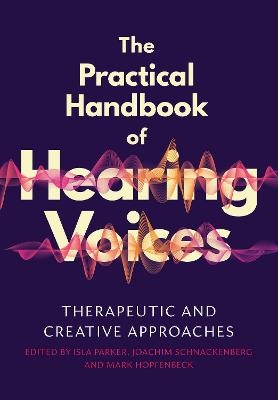
The Practical Handbook of Hearing Voices
PCCS Books (Verlag)
978-1-910919-91-0 (ISBN)
Hearing voices, seeing visions and similar out-of-the-ordinary experiences have long intrigued and mystified humankind. The dominant scientific and medical understandings of these phenomena tend to problematise them. This ground-breaking book builds on the work of the Hearing Voices Movement and of the researchers Marius Romme and Sandra Escher in challenging this perception. The book is a collection of chapters by voice hearers, mental health professionals and researchers describing a myriad of therapeutic and creative approaches and strategies that people find helpful in relating to voices when they find them distressing. It is based on insights, understandings and knowledge derived from the first-hand experience of voice hearers and from mental health practice and research that show that the person's relationship with the voices and what the voices say are key to understanding and living with them; that voices are not in themselves a problem and can even be helpful; that there is a strong connection between voices and unwanted emotions; that life-long medication is not the inevitable and only treatment and, most importantly perhaps, that voice hearers can live well with their voices (even if it is sometimes hard work). The book is presented in three parts: Part one, 'Hearing our voices', includes voice hearers' perspectives as to what has helped them to recover from breakdown so that they are able to live full lives, including Hearing Voices Groups and peer support. Part two, 'Emerging social and therapeutic approaches to working with voices', explores different mainstream non-medical and psychotherapeutic approaches that help voice hearers to make sense of and live well with their voices. Part three, 'Creative approaches to working with voices', describes using creative arts, such as dance, drama and poetry, to help voice hearers relate to their voices in positive ways.
Isla Parker is a pen name. Isla is a freelance editor and writer who promotes the understanding of health issues and wellbeing. She undertook a degree in English and found it interesting to study how literature explores illness. This led to Isla writing a novel about anorexia for teenagers called Size Zero?, which is loosely based on her own experience. Isla has also co-edited The Practical Handbook of Dementia. In her free time Isla enjoys playing the piano. She also takes part in an online writing group that has introduced her to writers from different countries. - Dr Joachim Schnackenberg is a UK-trained mental health nurse and Germany-trained social worker with experience of applying the Maastricht Hearing Voices Approach in acute and community settings. He is Director of Hearing Voices and Recovery at a Northern German mental health service provider (Diakonie Kropp). He has been part of the Hearing Voices Movement since 2000, as he was originally trained and mentored in the application of the Maastricht Approach by Ron Coleman and Karen Taylor, among others, with additional training by Marius Romme, Sandra Escher and Dirk Corstens, as well as ongoing training by every voice hearer and voice he works with or meets. In 2007 he started formally offering training in the Maastricht Approach in a variety of countries, together with his colleague Senait Debesay, a Germany-trained learning disabilities nurse and therapeutic educator, and a variety of trainer experts by experience. For his PhD, he completed the first mixed-methods effectiveness pilot trial of the Maastricht Approach and he has remained active as a trainer, supervisor, peer-reviewer and consultant in various research projects. In 2017 he lead-authored (in German) the first book to describe using the Maastricht Approach in practice. He is based in the UK and Germany. - Mark Hopfenbeck is social anthropologist specialising in health and social policy, an assistant professor at the Norwegian University of Science and Technology (NTNU), visiting fellow at London South Bank University (LSBU) and individual partner at the Collaborating Centre for Values-based Practice in Health and Social Care, St Catherine's College, Oxford University. At NTNU, he teaches mindfulness, is a member of the Relational Welfare research group and is involved in the development of a reflective group approach to support inmates' wellbeing and reduce isolation within prisons. For the past 15 years, he has been teaching and supporting the implementation of the Open Dialogue approach. He is currently co-investigator on a large-scale programme of research into crisis and continuing mental health care within the NHS (the ODDESSI study) and is on the advisory board of an international collaborative study to evaluate the effectiveness of Open Dialogue in various contexts around the world (the HOPEnDialogue project).
Foreword - Marius Romme and Sandra Escher; Introduction - Isla Parker, Joachim Schnackenberg and Mark Hopfenbeck; Part one: Hearing our voices; 1. The Maastricht Approach: social and personal perspectives on hearing voices - Dirk Corstens; 2. Hearing voices: why the words we use matter - Akiko Hart; 3. Hearing voices groups - Peter Bullimore; 4. Facilitating hearing voices groups - Sasha Priddy and Charlotte Howard; 5. Painting has helped me to cope with my voices - Reshma Valliappan; 6. Voices: victim to victor - Ron Coleman; 7. The things they say - Aimee Wilson; 8. Journey to recovery - Clifford O'Connor; 9. Hearing voices in grief - Jacqueline Hayes; 10. Spirituality, religion and voices - Christopher C.H. Cook; 11. Voice hearing and cannabis: a harm-reduction approach - Rufus May and Kate Quinn; 12. Black voices and the deafness of whiteness - Colin King; Part two - Emerging social and therapeutic approaches to working with voices; 13. Voices, values and values-based practice: engaging with what matters in voice hearing - David Crepaz-Keay and Bill (K.W.M.) Fulford; 14. An invitation to dialogue: what we can all learn from Open Dialogue and Hearing Voices Networks - Olga Runciman and Iseult Twamley; 15. Medication and voices: reflections from a relational perspective - Dirk Corstens and Joachim Schnackenberg; 16. Voice hearers at work - Caroline Moughton; 17. Navigating university as a voice hearer - Deborah Altman; 18. Experience focused counselling (Making sense of voices) - Joachim K. Schnackenberg, Oana-Mihaela Iusco and Senait Debesay; 19. Voice Dialogue - Ruth Lafferty and Rob Allison; 20. Experience focused counselling with children and young people who hear voices - Senait Debesay; 21. Understanding voices while living with dementia - David Storm and Ron Coleman; 22. How cognitive behaviour therapy can help people who are distressed by hearing voices - Mark Hayward; 23. Recovery-oriented cognitive therapy and distressing voices - Aaron Brinen; 24. AVATAR therapy: a digital therapy to help people with distressing voices - Mar Rus-Calafell and Tom Craig; 25. Relating therapy for voices: learning how to respond assertively in difficult relationships - Mark Hayward, Sheila Evenden and Angie Culham; 26. Meaning-making in voice hearing - Nicola Barclay, Guy Dodgson, and Anna Luce; 27. Responding to trauma dialogically: an introduction to peer-supported Open Dialogue - Mark Hopfenbeck; 29. A psychodynamic understanding of voice hearing - Christine Cox; 29. Compassion-focused therapy and the courage of compassionate relating to voices - Charles Heriot-Maitland; 30. Working with voices using the narrative genogram - Lykourgos Karatzaferis; 31. Mindfulness and hearing voices - Rufus May and Elisabeth Svanholmer; Part three - Creative approaches to working with voices; 32. Creative ways to engage with voices - Rufus May and Elisabeth Svanholmer; 33. Dramatherapy for people who hear voices - Louise Combes; 34. Dance movement psychotherapy and voice hearing: looking outward and inward - Mary Coaten; 35. Awesome metalcore therapy: using heavy metal music in therapeutic work with voices - Kate Quinn and Daniel Baines; 36. A safe space: sound therapy and hearing voices - Jane Ford; 37. How writing memoirs and poetry may help voice hearers - Isla Parker; 38. Music therapy in multi-disciplinary treatment - Stella Compton Dickinson; Conclusion - Isla Parker, Joachim Schnackenberg and Mark Hopfenbeck; Afterword - Gail A. Hornstein
| Erscheinungsdatum | 17.09.2021 |
|---|---|
| Verlagsort | Manchester |
| Sprache | englisch |
| Maße | 170 x 244 mm |
| Gewicht | 750 g |
| Themenwelt | Geisteswissenschaften ► Psychologie ► Klinische Psychologie |
| Medizin / Pharmazie ► Gesundheitswesen | |
| Sozialwissenschaften ► Pädagogik ► Sozialpädagogik | |
| Sozialwissenschaften ► Soziologie | |
| ISBN-10 | 1-910919-91-8 / 1910919918 |
| ISBN-13 | 978-1-910919-91-0 / 9781910919910 |
| Zustand | Neuware |
| Informationen gemäß Produktsicherheitsverordnung (GPSR) | |
| Haben Sie eine Frage zum Produkt? |
aus dem Bereich


